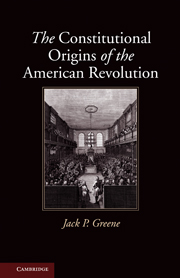Epilogue: Legacy
Published online by Cambridge University Press: 05 June 2012
Summary
For a century and a half before the American Revolution, metropolitans and colonials had wrestled with the difficult question of how, in the extended polity of the British overseas empire, to allocate authority in such a way as to preserve the British rights of colonists in the distant polities in America while providing a measure of central direction for the empire as a whole. Either explicitly or implicitly, this essentially legal and constitutional question was at the heart of the tensions that beset relations between colonies and Crown before and after 1763. When people on both sides of the Atlantic for the first time confronted it in a sustained and systematic way, between 1764 and 1776, they developed radically divergent views that ultimately led to the secession of thirteen of the North American colonies from the empire.
As James Madison later noted, for most colonial leaders, “the fundamental principle of the Revolution was, that the Colonies were coordinate members with each other and with Great Britain, of an empire united by a common executive sovereign, but not united by any common legislative sovereign.” Maintaining that legislative authority was distributed broadly and equally among the several corporate entities that composed the empire, the colonists insisted both that the legislative power of “each American Parliament” was as “complete” as that of the British Parliament and that “the royal prerogative was in force in each Colony by virtue of its acknowledging the King for its executive magistrate, as it was in Great Britain by virtue of a like acknowledgement there.” More than any other development, Madison correctly observed, “a denial of these principles by Great Britain, and the assertion of them by America, produced the Revolution.”
- Type
- Chapter
- Information
- The Constitutional Origins of the American Revolution , pp. 187 - 190Publisher: Cambridge University PressPrint publication year: 2010



